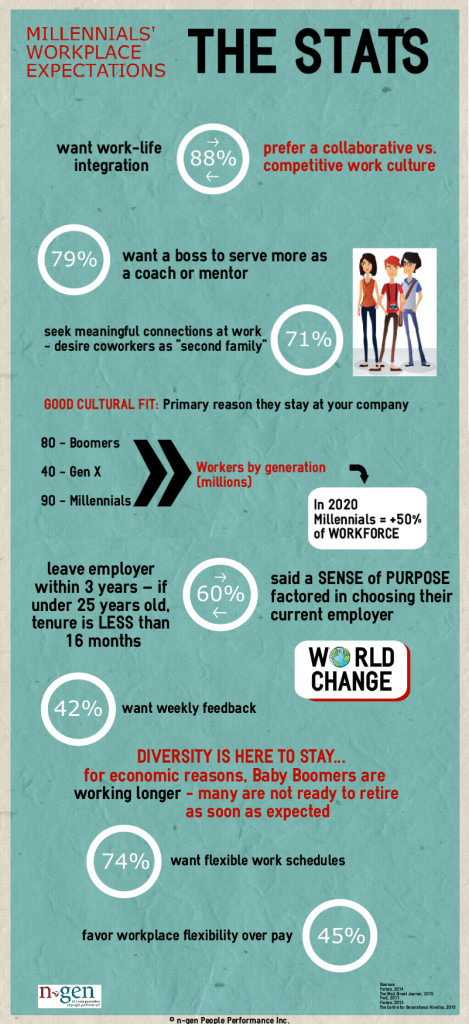Learning from Millennials at Work
One of the most common obstacles that I hear from employers is that they find it difficult to connect with Millennials and struggle to help them to “fit in” to the work environment. These struggles lead to stories from managers and HR teams about how the younger generation is too casual and “unprofessional”. This sentiment is reinforced by some recent articles that highlight how Millennials tend to swear more at work, how they don’t pay attention in meetings and how they would rather send a text than pick up the phone and call someone.
To a certain extent, these concerns are valid. Organizations have a speific culture, workflow and workplace dynamic that should be adhered to and respected. In addition, certain tactics that are favoured by Millennials simply won’t work in certain roles or organizations. For example, selling via text message may work for Millennials, but it doesn’t work in an organization where the target demographic is Baby Boomers and / or where there is an expectation of a lot of ‘face time’ with customers.
That being said, it’s also dangerous for employers (and members of other generations) to assume that when Millennials take a different approach, or act outside of the organization’s cultural norms, that they are entirely wrong and should be dismissed. I often hear from Millennial employees that they feel their skills, preferences, suggestions and concerns are ignored by their employers and colleagues. This can lead to younger employees leaving the organization in search of one that is “a better fit.” The reality is that often the grass looks greener on the other side which can contribute to turnover.
In general, organizations are the most successful (and employees are the most engaged) when different people, from different generations, work together and learn from one another.
Here are a few things that other generations can learn from Millennials.
Do Something You Care About
While employees will always be at least somewhat motivated by money, Millennials are increasingly searching for work that they care about. Many members of this cohort grew up watching their parents work at jobs they didn’t enjoy while still fearing job insecurity. This is a major reason why many Millennials have decided that it’s important to do something that you take pleasure from and not martyr yourself for an organization that doesn’t align to your core values.
Millennials are much more comfortable quitting their job and searching for something new if they aren’t satisfied and passionate about their work. There are many reasons for this. Some want to work for organizations that demonstrate a higher level of appreciation of their skills, others want jobs where they can move up in the organization more quickly, and others leave their current employer to search for work that is more meaningful to them.
The overwhelming theme is that Millennials don’t want to spend their time working in a role or for an organization, or for a manager that they don’t feel an emotional connection to.
According to the job website Indeed, Millennial cohort make up the largest percentage of employed people who are looking for other job opportunities. The younger and more educated that they are, the more likely they will be searching for new opportunities.
While not everyone can have his or her dream job all the time, it’s particularly important for Millennials to find a role (or an aspect of a role) that they are passionate about in order to improve engagement and retention.
Do Good
Millennials don’t just want to have jobs that they like, they also want to work for organizations that do meaningful work from a corporate responsibility perspective. One of the main issues that I hear from Millennial employees who are unhappy with their roles, is that they don’t believe that they’re making a meaningful contribution with their work.
Millennials don’t just want to contribute something to their organizations; they also want their organizations to do good in the world. This is certainly a trait that other generations can take inspiration from.
Blend Work and Life Together
Millennials tend to blur the lines between work and life. There are a number of reasons for this. One is because many members of this cohort, as mentioned, find work that they enjoy. They do not see work as an intrusion into their personal life because work is fun and aligned with their values.
This generation also blends work and life together because they fully embrace technology. It’s not an inconvenience for this cohort to respond to a work email on a Thursday night while they are out with friends, because they are already using their phone and can easily go between work and personal messages. However, this doesn’t mean that managers should expect a reply from younger employees at all hours.
Millennials aren’t just more accepting of bringing work into their personal lives, they’re also much more likely to bring their personal lives into work. They want to make friends with their co-workers and socialize at work. They also tend to have no issue with using “work time” to run personal errands. This is often because they believe that answering work emails on the weekend entitles them to shop for clothing online during work hours, for example. This blending of work and life makes it easier for members of this cohort to balance their personal and professional lives. That’s certainly something we could all benefit and learn from given the hectic nature of our lives.
Giselle Kovary
As president and co-founder of n-gen People Performance Inc., Giselle is dedicated to building strategies and programs that target, motivate and engage a multigenerational workforce. She is a sought after resource to industry leaders, having worked with 18 of the top Fortune 500 companies. Over 60,000 people globally have experienced an n-gen workshop or presentation. She has devoted more than fifteen years to researching the impact that generational differences have on organizational performance. Giselle has co-authored two books: Loyalty Unplugged: How to Get, Keep & Grow All Four Generations and Upgrade Now: 9 Advanced Leadership Skills. She has a Master’s degree in communication studies from the University of Windsor.


Connect With Us
Contact Us